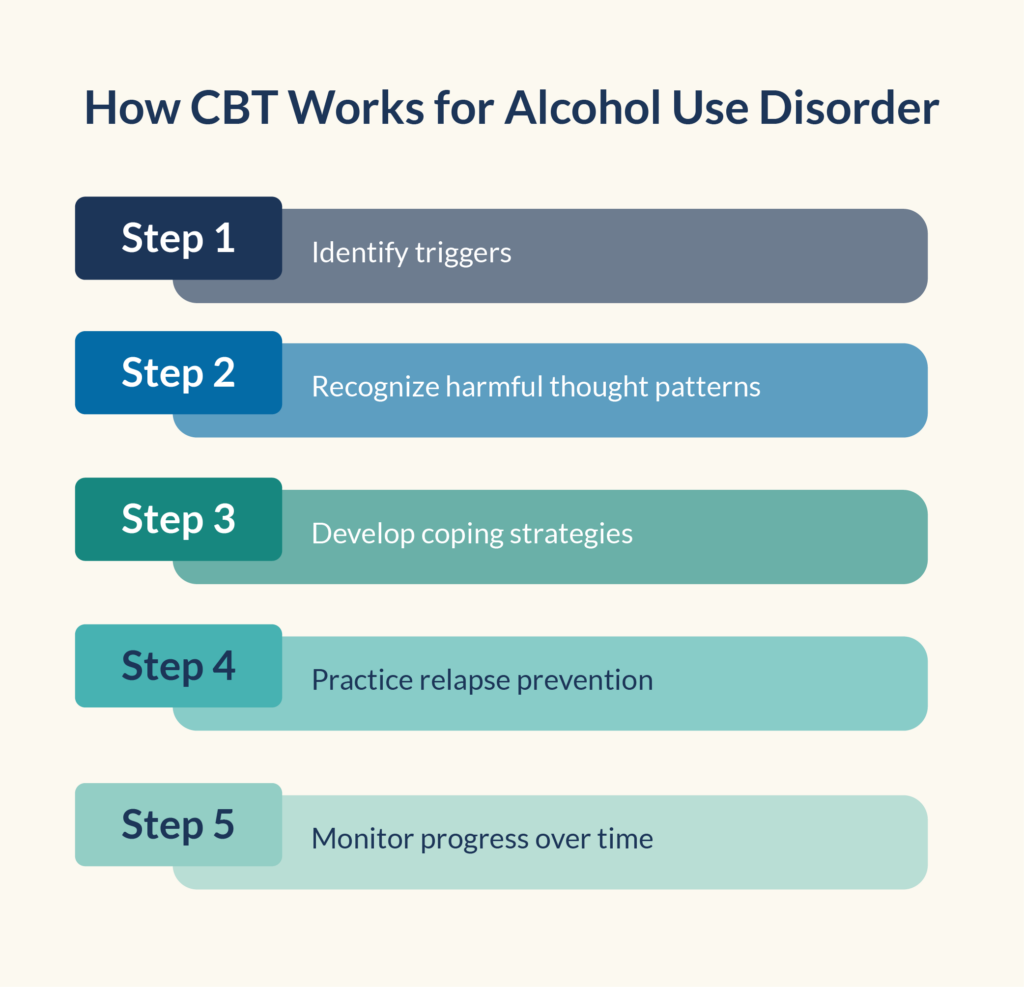What Is CBT?
CBT stands for cognitive behavioral therapy. It is the use of coping skills to help an individual recognize and restructure thinking and behavioral patterns. In other words, CBT is used to help individuals develop a healthier mindset. Oftentimes, CBT is used to treat alcohol addiction, as it helps individuals develop healthier thinking patterns that don’t revolve around alcohol consumption.
CBT identifies that thoughts and behaviors are interconnected. Patterns of thought lead to expressive behavior. When thoughts influence feelings, individuals often behave a certain way that reflects their emotions or the way they are coping with their emotions. Negative thought patterns can lead individuals to find a way to cope with their irritability, anxiety, or depression. One such way individuals cope: alcohol.
How CBT Is Used for Alcohol Addiction
CBT breaks patterns in the cycle of alcohol addiction by rewiring an individual’s thinking. Many individuals suffering from alcohol addiction turn to alcohol as a coping mechanism for their emotions. These negative thinking patterns arise, and the easiest way for an individual to alleviate them is by drinking. CBT focuses on using practical methods to teach the brain how to manage emotions and problems in a healthier way, that doesn’t involve picking up the bottle.
CBT uses many different techniques to treat alcohol addiction. This is an evidence-based treatment that varies depending on an individual’s needs. For example, one coping skill taught in CBT is using relaxation to manage stress. Using this alternative to manage stress teaches individuals not to rely on alcohol to cope with emotions. In another example, CBT uses self-monitoring awareness to track triggers of alcohol abuse, cravings, and mood swings. By recognizing patterns in alcohol abuse and triggers, individuals can find better ways to manage and control those behaviors and the feelings associated with them.
Does CBT Work for Alcohol Addiction?
CBT is an evidence-based therapeutic modality, meaning it is practiced based on proven scientific evidence and clinical decisions. It is one of the most commonly used therapeutic modalities to treat alcohol use disorder. Both inpatient and outpatient treatment programs incorporate CBT into their treatments, not just for alcohol addiction – but also for a wide variety of mental health disorders and addictions.

Key CBT Techniques Used in Alcohol Addiction Treatment
CBT aims at restructuring negative thoughts that control drinking behaviors for those suffering from alcohol addiction. Here are a few key CBT techniques used to treat alcohol use disorder:
- Coping skills training: finding alternative strategies to handle negative emotions like stress, anxiety, and cravings without using alcohol
- Cognitive restructuring: Replacing unhelpful negative thought patterns with more balanced, logical, realistic thinking
- Craving management: identifying early signs of craving alcohol and using distractions and delay techniques to disrupt the pattern
- Relapse prevention planning: thinking ahead and recognizing risks that can lead to a relapse, while creating a step-by-step plan of prevention
- Behavioral activation: replacing drinking habits with healthy and rewarding activities
- Self-monitoring: tracking patterns of negative thoughts and cravings to measure progress and recognize risks
- Refusal skills training: learning to say no to guilt or pressure when it comes to alcohol and drinking
There are plenty of ways in which CBT is used to help treat alcohol addiction and unhealthy drinking patterns. These are all focused on identifying when feelings, thoughts, or behaviors are negative in order to turn them into something more positive. This focus on positivity and healthier habits prevents risks of falling prey to alcohol addiction.
For serious cases of alcohol addiction, you may need a detox program. This may trigger alcohol withdrawal symptoms. For this reason, it’s important to go through an official program, as withdrawal symptoms are best supervised by health professionals who can identify and treat serious concerns, like delirium tremens.
If you or a loved one have been struggling to overcome alcohol addiction, it may be time to seek CBT through an alcohol addiction treatment program. There are two types of programs offered: outpatient and inpatient. Consult with Behavioral Health Centers to determine which option is best for you or your loved one. Mental health and health professionals are there for individuals throughout their entire road to recovery.









